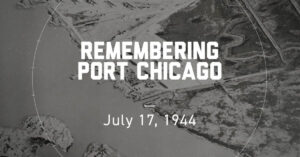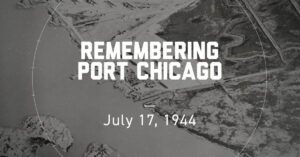
WHOI’s Plan Of Dumping 20 Tonnes Of Lye Off Cape Cod For Ocean Alkalinity Study Criticized By Environmentalists
July 17, 2024
Cargo Ship Hits Barrier Beneath Miami’s Brickell Avenue Bridge, Probe Underway
July 18, 2024

On the 80th anniversary of the catastrophic explosion at the Port Chicago Naval Magazine in California, the Honorable Carlos Del Toro, Secretary of the Navy, announced the complete exoneration of the remaining 256 defendants in the 1944 Port Chicago general and summary courts-martial.
The announcement is a crucial step toward rectifying the historical injustices experienced by African-American sailors during World War II.
The Port Chicago explosion, which occurred on July 17, 1944, killed 320 people, including Coast Guard men, Civilians, Sailors, US Maritime Service personnel, and one marine.
The explosion also injured 400 others, destroyed two ships and a train and caused major damage in the nearby town of Port Chicago.
Secretary Del Toro expressed his heartfelt condolences to the victims and their families, honouring their memory and sacrifice.

Following the explosion, white officers were granted hardship leave, while surviving African-American sailors were ordered to go back to duty.
The Navy’s personnel policies at the time severely restricted African-American sailors to non-seagoing duties, relegating them mostly to ordnance battalions at sites such as Port Chicago, which white officers commanded.
258 African-American sailors refused to resume ammunition handling duties due to the explosions’ unidentified causes and a lack of additional safety training.
Following threats of disciplinary action, 208 of these sailors returned to work but were eventually convicted of disobeying instructions at a summary court-martial.
They were given Bad Conduct Discharges and a three-month pay forfeiture, but later reviews resulted in discharge suspensions, reduced forfeitures, and the dismissal of one conviction due to inadequate evidence.

The remaining 50 sailors, known as the “Port of Chicago 50”, refused to return to duty and were charged with mutiny.
They were convicted in a mass general court-martial and sentenced to Dishonourable Discharges, 15 years of hard labour, rank reduction to E-1 and total pay forfeiture.
Dishonourable discharges were suspended following subsequent reviews, and the confinement period was reduced to 17 to 29 months.
By January 1946, nearly all sailors were released and allowed to finish their contracts.
Secretary Del Toro highlighted the importance of remembering the Port of Chicago 50 and their fellow sailors for their heroism and pursuit of justice.
Del Toro stated that the sailors stood as a beacon of hope, reminding everyone that even in the face of terrible odds, the fight for what is right should always prevail.

The Navy’s General Counsel conducted a thorough review, which found major legal errors made during the court-martial.
Defendants were unfairly prosecuted together and denied an essential right to counsel.
The court-martial was held before the Navy’s Court of Inquiry report on the explosion was completed.
It would have supplied critical information for their defense and included suggestions to improve ammunition loading procedures.
The current assessment resulted in Secretary Del Toro’s decision to fully exonerate the remaining 256 defendants, demonstrating the Navy’s continuous commitment to resolving historical injustices and guaranteeing equal treatment for all Sailors, Marines, and civilians under its authority.
The exoneration comes after previous efforts to correct these mistakes, such as the suspension of several sentences and President Bill Clinton’s 1999 presidential pardon for one of the defendants convicted of mutiny.
The Navy’s decision represents a powerful confession of past mistakes and a commitment to upholding justice and equity within the ranks.
Reference: US Navy
U.S. Navy Exonerates 256 African-American Sailors Punished After 1944 Port Of Chicago Explosion appeared first on Marine Insight – The Maritime Industry Guide
Source: Maritime Shipping News


